One might think that anyone who loves horseback riding would look forward with sheer excitement and delight to the joy of climbing into the saddle. But if you find yourself feeling increasing tension, stress, and anxiety before a ride, you are far from alone. You can love something with all your heart and still be super anxious about doing it. In this article, we’re going to give you tips for reducing riding anxiety.
Tips to Reduce Horseback Riding Anxiety
But first, let’s go over some of the reasons why riding anxiety happens. If you, or someone you know, struggles with being anxious about riding, it's actually perfectly normal. Below I will share some of the reasons why this happens, then go into the ways you can reduce that anxiety and make horseback riding a bigger part of your life.
What Are Some Causes of Riding Anxiety?
There are a lot of possible reasons why riders might experience anxiety, but here are some common ones:
Safety concerns
Riding a horse, like driving a car, can be a relatively safe activity if you know what you are doing and always take appropriate measures to minimize risk. But horses are big animals. Working with them is never 100% safe, and there are a lot of things that can go wrong. If you ruminate on these possibilities enough, you will probably get nervous.
A previous accident
If you or someone you know had a bad accident on a horse at any point, that experience is bound to leave a mark on your psyche. You may be scared either consciously or unconsciously that it will happen again.
Recent performance problems
We all have phases where we do not ride as well as we usually do, and make more mistakes than usual. If you have recently had one of these streaks of poor performance, you might lose confidence in yourself.
Growing up with an overprotective parent
Did you learn how to ride as a child? Maybe you had a parent who gave you a lot of bad feedback. Even if they were supportive, they might have worried a lot about you. But in doing so, instead of communicating the message “horse riding can be dangerous, make sure you are riding safely,” they communicated the message, “you are incapable of riding safely, you do not know what you are doing.” Whether they meant to do that or not, that is what your brain and body learned. And even as an adult, you might struggle with feelings that you are an inadequate rider.
Dealing with bad feedback from an early trainer
Poor feedback from a trainer growing up could also cement your feelings that you are not a strong rider. Like messages from your parents, messages from trainers might also keep ringing in your head long after you received them.
Competition nerves
Losing your nerve sometimes might be the result of having recently done poorly in a competition. Alternately, you might have a competition on the horizon, and be nervous about that.
Issues with a specific horse
Maybe you have a new horse, and you are still struggling to build a working relationship with that horse. If the horse makes you nervous, you are going to be afraid of getting in the saddle. Sometimes, it may just be destructive behaviors that need to be managed. Not all horses are bad horses, and most that struggle just need help.
General anxiety
If you happen to have a generalized anxiety disorder (GAD), obsessive-compulsive disorder (OCD), or another anxiety disorder, it could impact any aspect of your life, including horseback riding. Even if you just have an anxious disposition, but not at clinical levels, it is possible that you could feel scared to get on a horse.
General issues with self-doubt
If you have any broad difficulties when it comes to self-esteem, you might be afraid of riding a horse. In particular, if you are prone to self-sabotage, you might try to talk yourself out of continuing to engage with horses, even if you are passionate about riding.
Kids aren't the only ones who fear horses, if you are an adult that struggles, here is a list of tips for adults getting past the fear of horses.
Tips for Overcoming Riding Anxiety
Now that we have talked about some of the most common reasons for riding anxiety, let’s discuss some ideas for overcoming it.
1. Calm yourself to calm your horse.
Do you feel scared to ride in part because your horse seems nervous about it too? You might think the horse’s body language is the source of your own nerves, but it could be the other way around.
Horses can detect our moods. So, when we are nervous, they can start to mirror our anxiety. It could actually be that you are the one who is causing your horse to be nervous, and if you can manage to calm yourself, your horse will also be calm.
Of course, you might still have a hard time doing this. But sometimes, just knowing that we can make a difference in how our horses behave by managing our own emotions gives us the mental strength to make it happen. We even have some great tips for calming a nervous horse to help you get started.
2. Slow down if you need to.
Sometimes, the trick to dealing with anxiety is to charge on ahead and confront it directly, doing something that scares you. But that isn’t always the best course of action. It is entirely okay to take the opposite approach when you find it helpful.
Consider slowing down. Stop pushing yourself to take on the next challenge no matter how scary it feels. Instead, just get used to riding at your current level. You should become more confident in your abilities as you continue to ride competently. Eventually, you may discover that moving up to more advanced riding sounds less scary.
If you are being pressured by others to ride at a higher level immediately, remind yourself that it isn’t they who are climbing into the saddle each day—it’s you. And you are doing just fine without pushing yourself. The only person you need to answer to is yourself.
Still, struggling? here are some great ways to stay calm in the saddle.
3. Picture good possibilities, not bad ones.
Do you tend to run disaster scenarios through your mind? If so, you are going to make yourself nervous. Next time you find yourself imagining yourself or your horse having an accident, instead, imagine yourself going out for a pleasant, safe, enjoyable ride.
Imagining good possibilities can be soothing, and those possibilities are more likely to come true if you are a reasonably safe rider. Just think about the fact that horses are so beloved that they are even now therapy horses in some situations.
4. Try breathing exercises.
Used properly, breathing exercises can help to calm down your nervous system, which can be helpful if you are having a panic attack. There are multiple different types of breathing exercises you can try. Some people may do better with some types of breathing than others.
Regardless, here are some general recommendations:
- Breathe from your diaphragm, not solely from your chest. This is the key to taking deeper breaths with less effort.
- Do not breathe too rapidly, or you may hyperventilate.
- Spend less time inhaling than you do exhaling and/or holding your breath (with lungs full or empty).
Some people like to meditate on their breath, while others prefer to do an exercise without focusing their full attention on it. Do whatever works for you.
5. Challenging yourself in realistic ways.
While it is okay to keep performing at the same level, you are going to want to challenge yourself to become more advanced. But here’s the thing—if you are setting goals that are not realistic given your existing skill level, you are just going to be setting yourself up to fail.
Some of us actually do this habitually. In some cases, it might just be that we tend to dream big. In other cases, we might actually be self-sabotaging because we were taught growing up that we are failures—and believing that is less scary than changing our view of ourselves.
But the more unrealistic goals you set, the more evidence you will cultivate that “proves” to you that you are a poor rider. That is going to result in you getting progressively more nervous with time. The solution is to think hard about the goals you set. They should be just above your current skill level, not several levels beyond where you are at.
If you have a hard time with this, you may find it helps to ask for feedback on your prospective goals from a trainer or another rider who knows you well and is familiar with your skill level. Even though progressing in this way is gradual, at least you will progress, building confidence as you go. Instead of “proving” to yourself you can’t do it, you will prove to yourself that you can.
4. Focus on your successes, not just your failures.
It is so easy to dwell on the things you perceive you have done wrong (real and imagined). But it can be hard to keep sight of the things you have done well when you stay focused on your failings.
So, try to remind yourself on a regular basis to think about the things you are good at. When you are reviewing your failures in your head, review your victories as well, and remind yourself that they are just as important.
5. Understand how your horse thinks and communicates as much as possible.
When you first start horseback riding, you may know very little about how horses think, feel, behave, and communicate with each other and with us.
Naturally, you are going to feel nervous around an animal that seems alien to you. You are constantly guessing what is going on in its head.
- Is my horse really all right, or does it just seem all right?
- How is it going to react to _____?
- Will I know if something is wrong?
- What if I miss what my horse is trying to tell me?
Questions like these running through your mind all the time will certainly flare up your nerves. So, expand your knowledge of horse behavior as much as possible. You can do this through a combination of reading, watching videos, taking classes, and just spending more time with your horse.
The more knowledge you build about horse behaviour and communication, the more confident you will feel predicting your horse’s actions and responding to situations that arise when you are riding.
6. Replace negative self-talk with positive self-talk.
I am never going to get this! Why did I think I could do this?
Do you say things like this to yourself a lot? If you do, you are actively persuading yourself to believe that you are incapable. And if you believe that, how could you not feel anxious about getting on a horse?
Try and be alert for this type of self-talk. Often, we are not even aware we are doing it. When you catch it, replace it with positive self-talk instead.
For example,
I know I am as capable as any other rider of getting this; it will just take time and practice.
7. Keep a list of the things that scare you, and look back at it now and again.
One useful thing you can do to manage all sorts of anxieties is to write down what you are afraid of. Doing this can help out in a couple of ways. First of all, when we externalize our thoughts, we tell our brains, “It is okay to stop circling back to this again and again. We have the thought in writing.”
Second, we can look back later at our lists to see what actually happened with the things that scared us. Oftentimes, we will discover that we did not experience those things or were able to handle them better than we expected. Try maintaining such a list for a few months, writing down all the things you are worried about happening while you are riding. Then, look back at it. When you see just how few of the things you were scared of actually took place (maybe none), it can be very reassuring.
You might even find that equine therapy is a good solution to help you get past specific fears in a controlled setting with more professional help.
8. Do not rush yourself when preparing.
Struggling to juggle all of your tack, and hurrying through the process of grooming your horse and preparing for a ride? Your horse senses all of this.
You can bet that your horse is likely to be nervous as a result of your rushing to get to your ride. Not only that but there is a good chance that you will also end up getting tense. Feeling like you are late for something is never a formula for approaching it with a calm state of mind.
9. Get in shape.
Does any of your concern about what could go wrong while you were on horseback have to do with feeling that your body is too fragile for riding?
There are some things we cannot fix—like old injuries or asymmetries in our bodies that might cause problems. But a lot of weaknesses can be compensated for when we are in shape. So, consider doing more strength training, endurance training, and so on. Work on your balance and reflexes. Every aspect of your fitness you can improve will help you to feel more confident about riding.
10. Replace any old, worn tack you have in use.
Are you relying on old gear? Are you riding in clothes that do not provide suitable protection? Are you missing safety equipment? All of these are rational reasons for anxiety about riding. Worn-out gear isn’t safe for riding. So, in this case, the last thing you want to be doing is ignoring your anxiety. Instead, you should shop for appropriate equipment and make sure all of your tack is in excellent condition.
At that point, you should feel less anxious while riding, and you will definitely be safer. If you aren't sure if it is your tack, check out these signs that your tack isn't working.
11. Try hypnosis.
There are a number of hypnotherapists who produce materials for equestrians. You may find that hypnosis helps to induce a relaxed state of mind and dissipates some of your tension. It also might help you to ingrain more positive self-talk and more helpful messages that dispel anxiety and reinforce confidence.
12. Reward yourself for achieving goals.
When you do achieve one of your equestrian goals, do you just tell yourself “well done,” and move on to the next? Or do you give yourself some kind of a reward? If you are not rewarding yourself for achieving goals—especially those that require you to do things you find scary—you are missing an opportunity.
How can rewarding yourself help you overcome riding anxiety? Well, if you know a reward is in your future for doing something hard, it can act as a motivator. It can be easier to press forward if you stay focused on the reward, and not on the fear you attach to the task at hand. Also, if you make your rewards things, rather than experiences, you will have them around as physical evidence later that you are capable of overcoming your fears and achieving your goals.
So, for example, you could reward yourself for doing something that makes you anxious with a premium item of tack. Every time you use that tack in the future, it will remind you of how you successfully overcame your anxiety in the past and can do it again now. That means that just using that tack may help to soothe your overall anxiety about riding going forward.
13. Spend more time with your horse when you are out of the saddle.
Outside of riding, how much time do you spend with your horse? Do you just do the minimum that you need to when it comes to feeding, washing, and grooming, or do you spent social time with your horse, just getting it used to your presence?
The more time you spend with your horse, the better. But if you are only spending time with your horse when you are riding or working, your horse may be used to associating you with low-grade anxiety, tension and stress. The result can be a feedback cycle that increases nervousness for both of you.
How do you get around this problem? The ideal solution is to figure out whether there are any regular activities you do in a calm state of mind that you can do around your horse. For instance, if you read the newspaper every day, instead of reading it at your kitchen table or in your armchair, think about bringing it with you to read at the barn while sitting next to your horse. As you do these calm types of activities around your horse, both you and your horse should learn to feel more relaxed around each other.
14. Know why you are riding, and make sure your habits support that goal.
Some people ride for competitive reasons primarily, while others ride mostly to experience a bond with an amazing animal and to have a good time. But it can be easy to feel pressured into getting more and more competitive with your riding even if that is not the main reason you are an equestrian.
You might find yourself pushing yourself to try and meet expectations that aren’t really in line with your desires. If you do that long enough, you will start burning out, and you’ll find yourself enjoying riding less and less. Ask yourself whether some of your stress and anxiety could be the result of pursuing goals that aren’t really your own. If that seems to be the case, consider revisiting your original reasons for becoming an equestrian.
Not everybody needs to be a competitive horseback rider. Your ultimate goal should just be to have a rewarding experience. If that involves cutting back on ambition, doing that is absolutely okay. You will be happier and less tense, and so will your horse.
15. Ride with a friend.
Are you always worrying about what might happen if you have a problem while you are riding out in the wilderness by yourself with no assistance? If so, maybe the best way to prevent some of your riding anxiety is to remove the “out by yourself” part of the equation.
If you have a friend who also rides, consider asking them to go with you sometimes. If you do not, look for an activity partner locally. There are other equestrians out there who also would feel safer riding with a partner. On that note, in general, having access to a community of equestrians can be a big help with respect to reducing riding anxiety.
With a community on your side, you know you can get answers to questions, and that someone is more likely to be there to offer you help when you need it. You also can ask other riders about how they handle riding anxiety.
16. Work with a horse that actually is suited to you.
If you are dealing with a “spirited” horse as a beginning or intermediate rider, chances are good you are going to be nervous about riding—and for good reason. Horses like these are best suited to more advanced riders who also have experience with training them.
If you are trying to push yourself beyond your experience level to deal with a headstrong horse, you are not doing yourself or the horse any favors. All you are going to do is create a lot of stress for both of you. You will feel much less nervous to go riding if you have a mount that is appropriate for your skill level, personality, and riding goals.
So, if you are leasing a horse that isn’t working out, it may be time to lease a different horse. Hopefully, you have not purchased a horse that is not a good fit for you. But if you are thinking about shopping for a horse in the near future, this is a good time to think hard about the mount you will buy.
Not so sure about leasing or buying? Here is a list of pros and cons of leasing a horse for you to consider.
17. Don’t get hung up on what other riders are doing.
It is hard to feel confident in yourself when you are constantly worrying about how you measure up to your fellow riders.
- Are you always comparing yourself to other riders training at your school?
- Are you trying as a beginner to match your trainer’s abilities?
- Are you struggling to imitate the expert riding of an equestrian you follow on YouTube?
Comparisons like these are unfair. First of all, we have a tendency to completely gloss over the fact that we do not have the same skill and experience levels of many of the riders we are trying to measure up to. Secondly, even comparing yourself to another rider with your approximate experience level is not fair to you.
Why? Because that rider is a completely different person. They have different considerations when it comes to fitness, psychology, and other aspects of their being. They also are riding a different horse than you. Their schedule may differ from yours, as might their resources. There are so many factors that make the experiences of any two riders non-equivalent. Chances are good you are dealing with obstacles that another rider is not.
That doesn’t mean that you are inferior in any way. It just means that you face greater challenges than someone else might, and you may take longer or have to work harder to achieve the same results.
18. Practice falls.
How many times have you fallen off your horse? How many times have you done so in a controlled, practiced fashion? A lot of equestrians have never trained how to fall correctly. But just as you can learn to do this for other sports, you can learn to do it for horseback riding.
Practicing this with a horse would obviously not be feasible. But fall training programs offer other means of learning how to fall properly:
- Practicing fall techniques with mats (rather like gymnasts do).
- Using a simulator machine that replicates the experience of being thrown off a horse.
Simulators can even be programmed to reproduce different types of fall scenarios. The speed of the fall event can be adjusted as well. As the equestrian using the machine falls, they will land on a padded mat. Equestrians can practice the same types of falls over and over again with these machines. They can also playback videos to see what they are doing right and wrong.
It may not be fun to think about falling off a horse, and some riders would prefer to imagine it never happens (or will never happen to them). But falling off of a horse is not something you want to put in the mental pile of impossible things and never learn how to do correctly. Even if you tell yourself you are never going to fall, just knowing you don’t know how to do it right is going to raise your anxiety.
So, take a class to learn. You will ultimately end up feeling much better about things if you do, because you will know that even in a scenario where you are falling off your horse, you will have the best chance of being able to minimize your injuries.
19. Explore the underlying beliefs and assumptions that drive your anxiety and where they come from.
As we have mentioned a few times already, there is a good chance that your anxiety could be a reflection of what you believe about yourself. But if you do not think it through, you might not become aware of your adverse beliefs and how they are affecting you.
Observing your negative self-talk is a good starting point. For instance, consider the thought, “I never do anything right, do I?”.
If you think things like this a lot, of course you will feel anxious about riding—you believe that there is something inherently incapable about you. You might think another rider would be safe in the same scenario where you imagine you would be in danger of countless mistakes.
- But why do you have that belief?
- Why do you think you always screw up?
You might list experiences from your past. But if you dig deeper, you may find that you went into those experiences with similar negative beliefs driving you. For instance, you might set unrealistic goals for yourself, fail to meet them, and then declare, “I never do anything right.”
In doing so, you prove to yourself repeatedly that this belief is correct—even though you were setting yourself up for that result. Somewhere before all that, way back in your childhood most likely, somebody convinced you to believe that you were inferior in some way.
Sometimes we learn these lessons from parents who abuse us, but often we pick them up from parents that mean well but sabotage us in some way. The parent who always finished your school assignments for you when you were lagging behind is a good example. That parent meant well—they were just trying to help you pass. But by constantly trying to rescue you from possible failure, they trained you to rely on them. They ingrained the belief that you could not finish your assignments without their help.
If they became pre-emptive about it, getting involved before you were even behind, that would make it even worse. As an adult now, you might believe that the same thing applies to other areas of your life. Whether it is holding down a job, driving to the grocery store, or riding a horse, you may feel like there is something “wrong” with you that prevents you from making it happen on your own.
Horse Courses by Elaine Heney
- Listening to the Horse - The Documentary by Elaine Heney & Grey Pony Films
- Shoulder In & Out Training for better balance, bend & topline development with your horse
- Over 110+ Polework Exercises & Challenges to Download
- Dancing at Liberty & Creating Connection with Your Horse (11 lessons) - Grey Pony Films
But there is nothing wrong with you. You are okay just the way you are. Once you understand where your negative beliefs and assumptions come from, they lose a lot of their power. At that point, you truly know you are capable of achieving your goals, including riding safely. That knowledge can help to reduce your anxiety at the source, not just treat the symptom.
20. Ride more, not less.
If you have been feeling anxious about riding, you may have been skipping more and more rides you had planned on taking. If that is the case, you might be avoiding confronting your anxiety, but it is still there.
Worse, it is controlling your actions, and keeping you away from something that you love. You are going to feel uncomfortable for a while getting back in the saddle. But it helps to understand that feeling uncomfortable now and again isn’t “bad.”
The reality is that the more you avoid riding, the harder it is going to be for you to get back to it. You will build it up in your mind as unattainable, and you will have fewer positive experiences to change your perspective. But if you go out riding consistently, you will have a chance to prove to yourself that you are a competent, safe rider.
It will take some time, but eventually, your body and mind should start to get the message, and you should begin feeling more relaxed before and during your rides.
You Can Overcome Anxiety About Horseback Riding
Even if you really love horseback riding, it is perfectly normal to feel some degree of nervousness or anxiety about getting in the saddle.
Now you know more about some of the common causes for horseback riding anxiety as well as some ideas for how you can combat your nerves.
Hopefully, you will have success with reducing your feelings of anxiety over time, especially as you build experience and confidence. But even if an element of nervousness always remains, it is possible to make the decision to punch through it and persevere. The amazing experience of riding and caring for a horse is worth it.

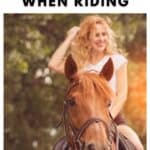
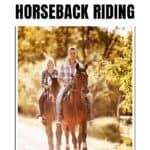

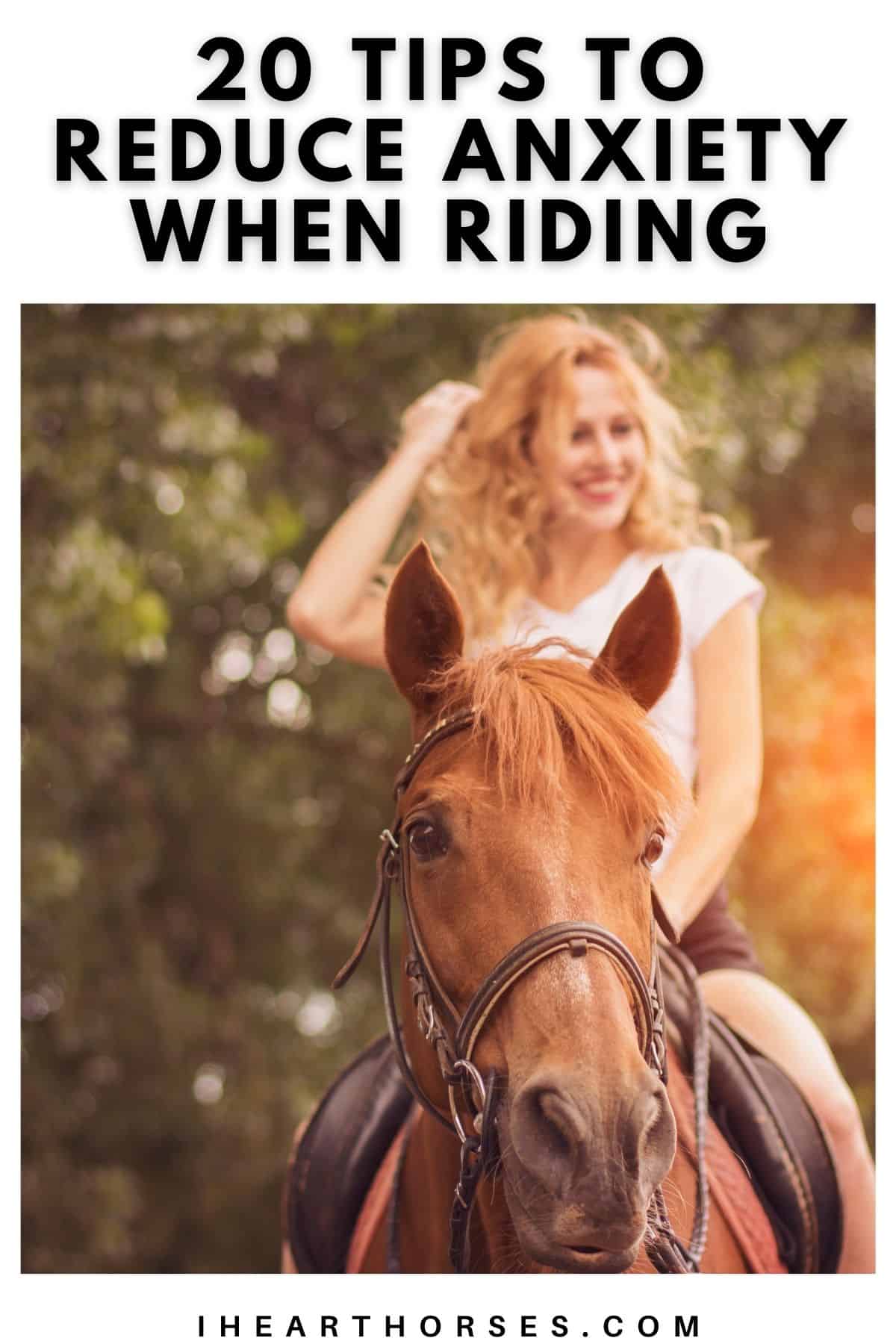
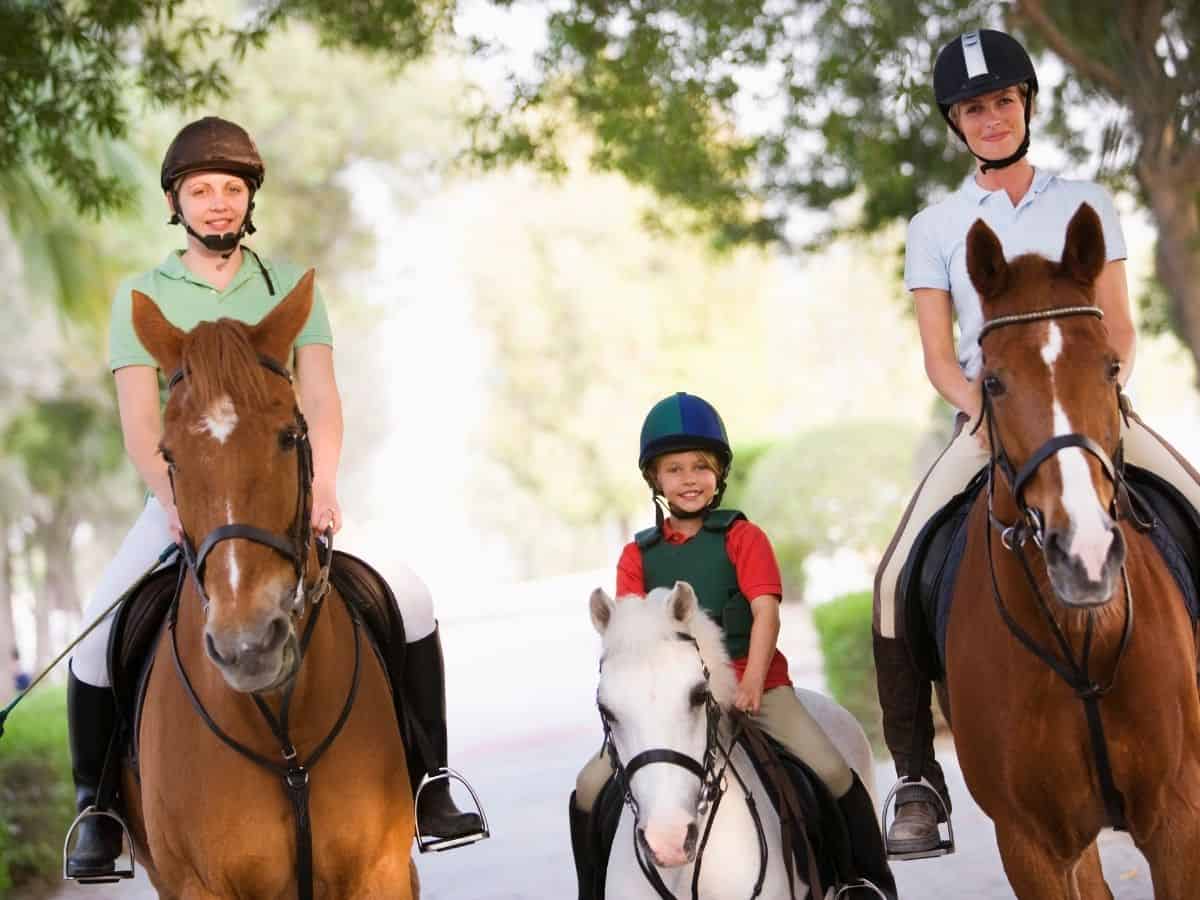
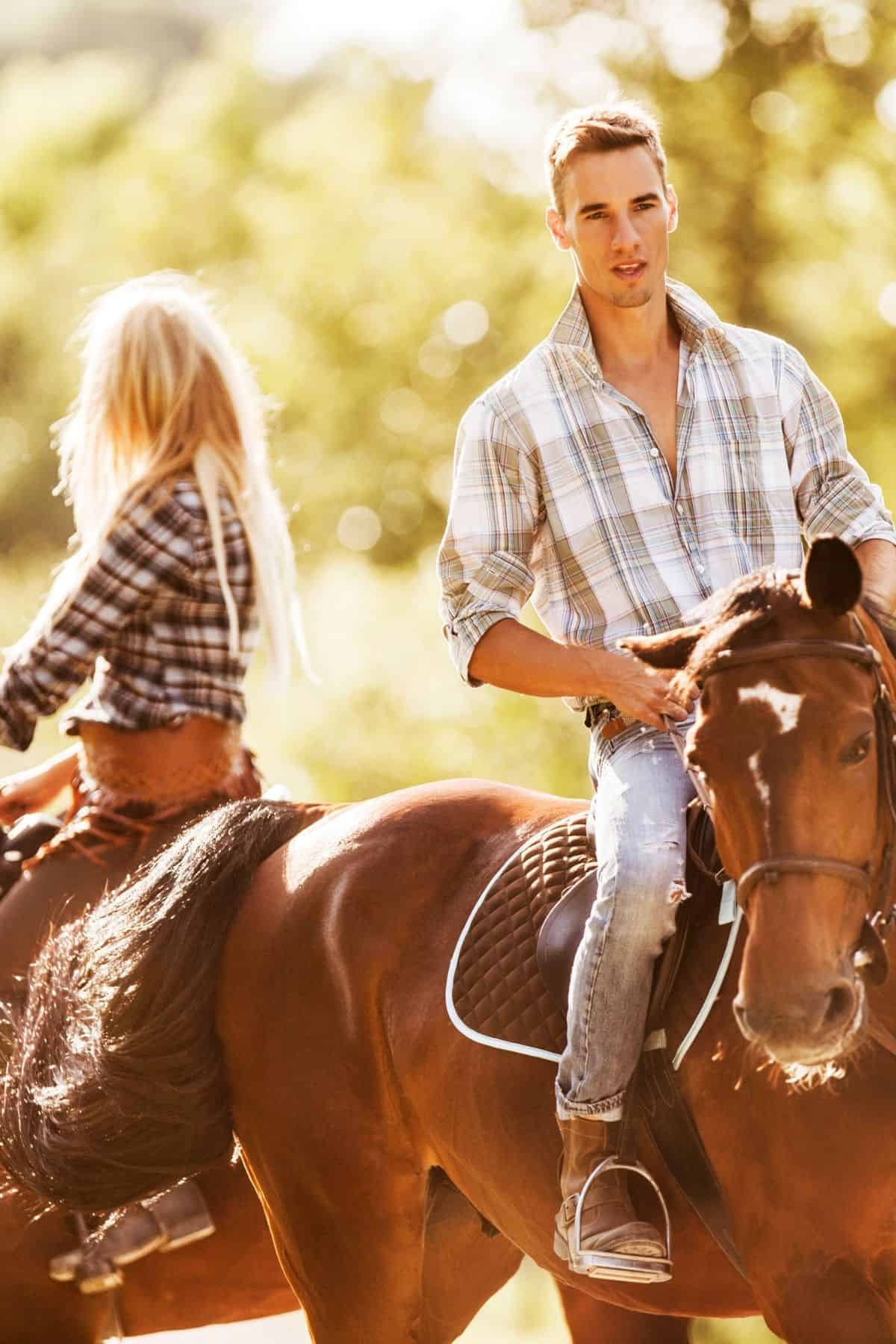
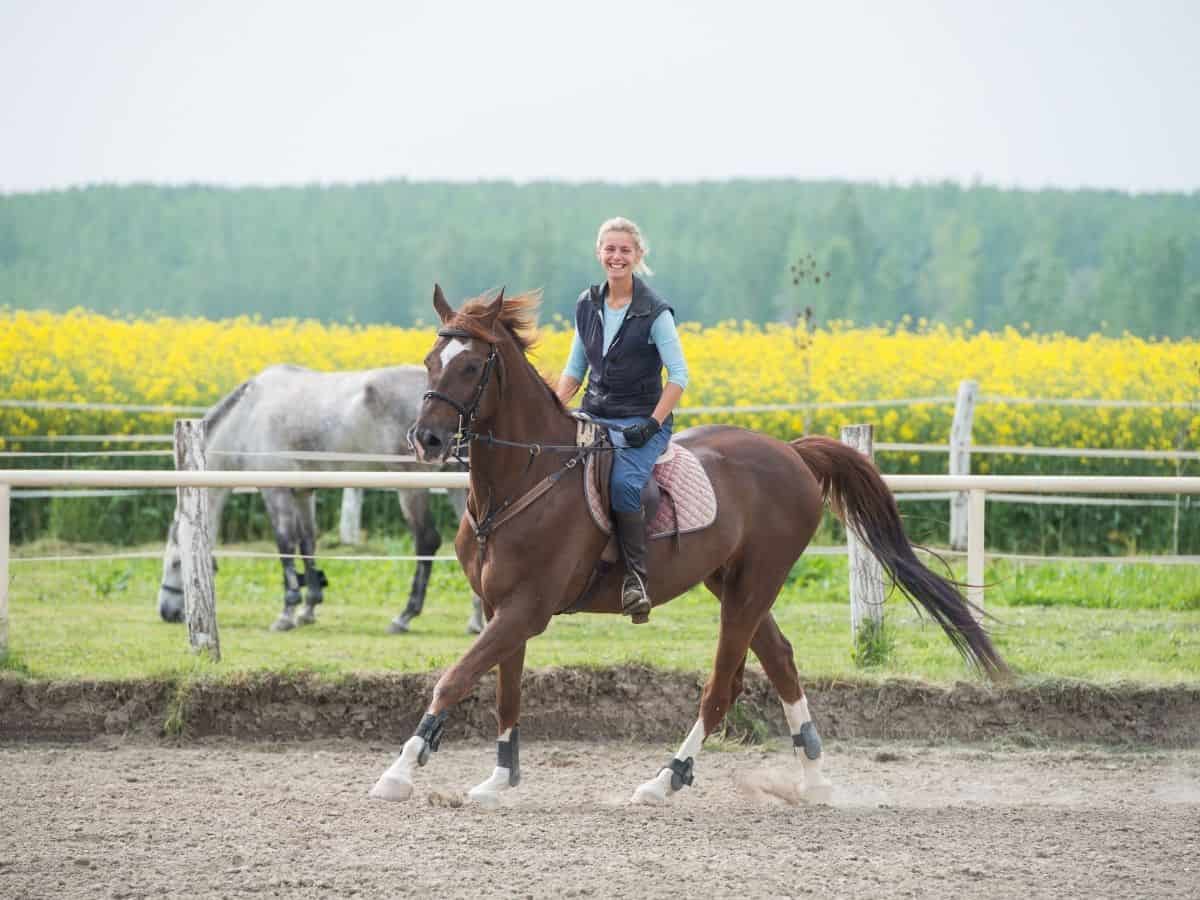
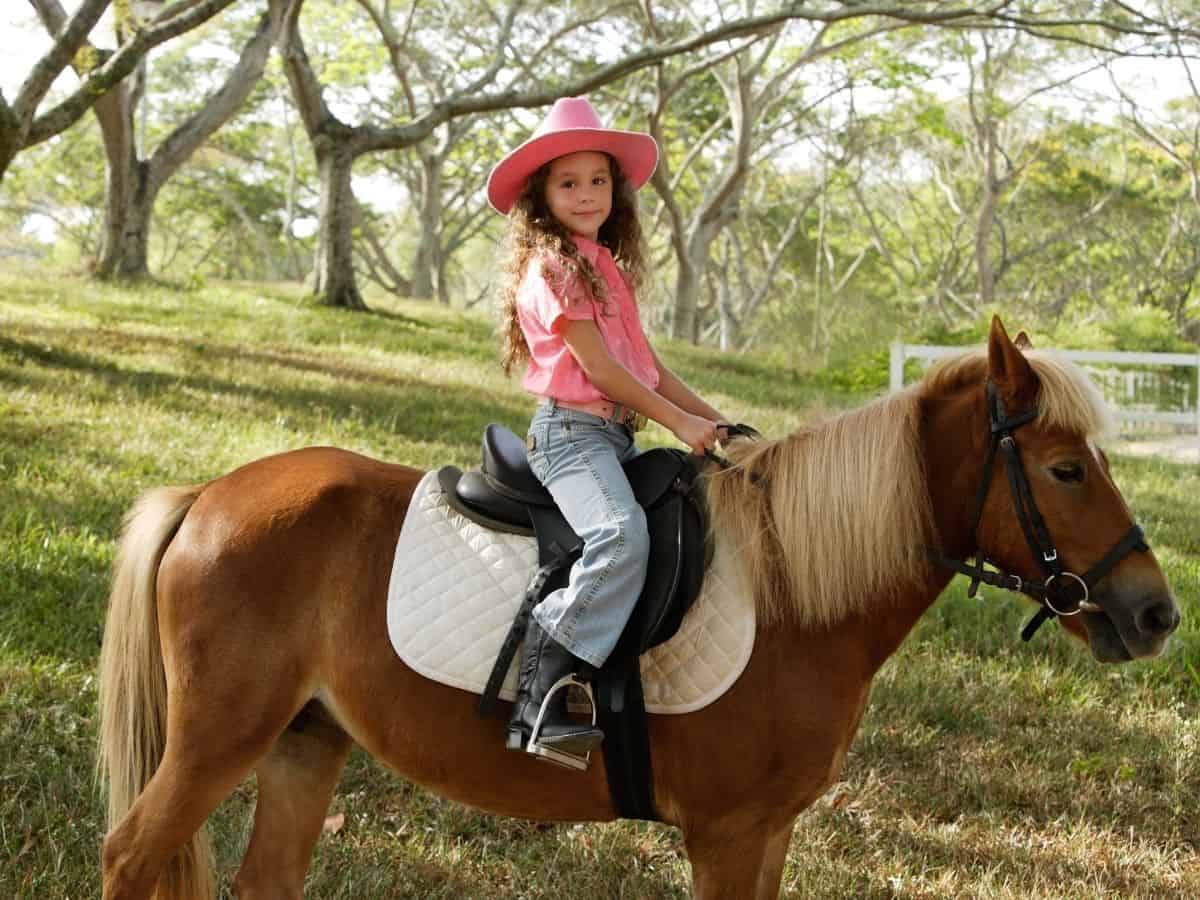
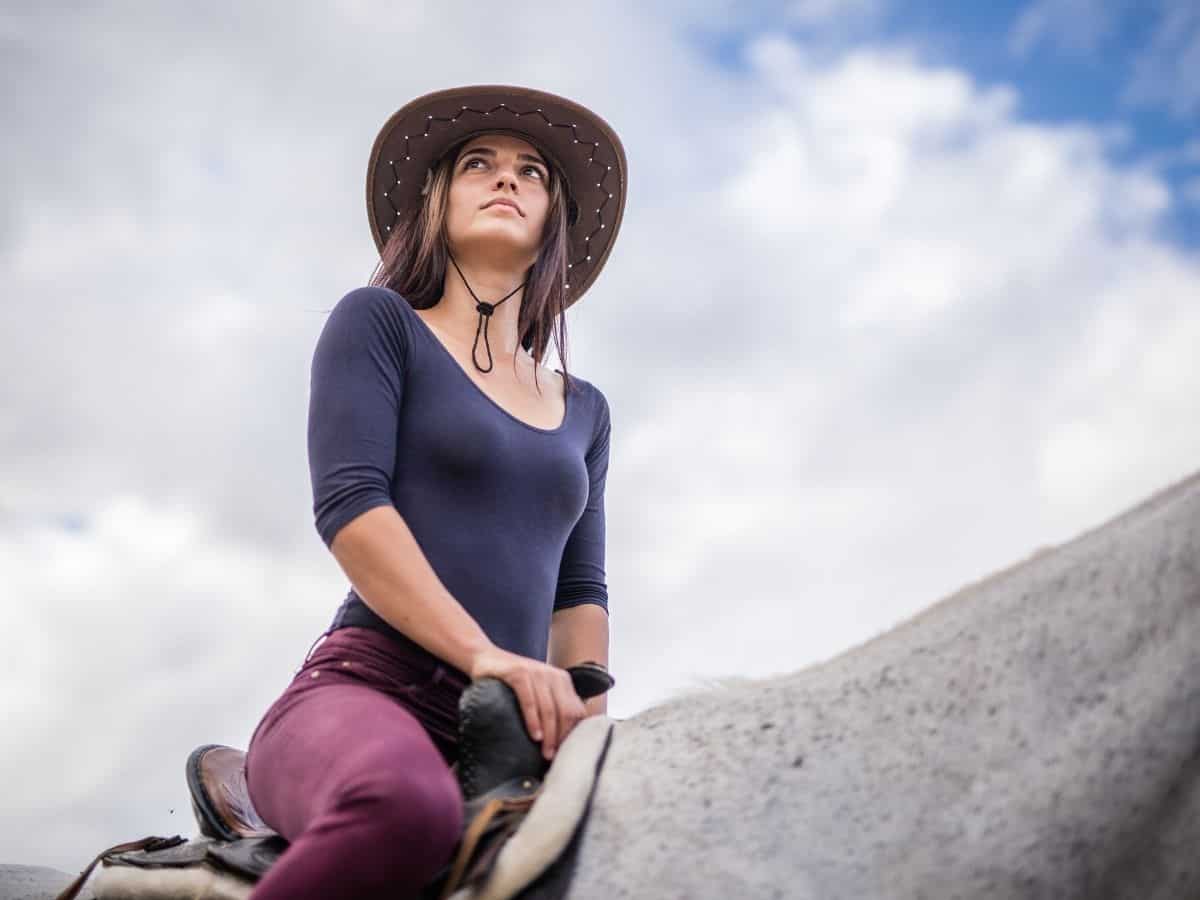
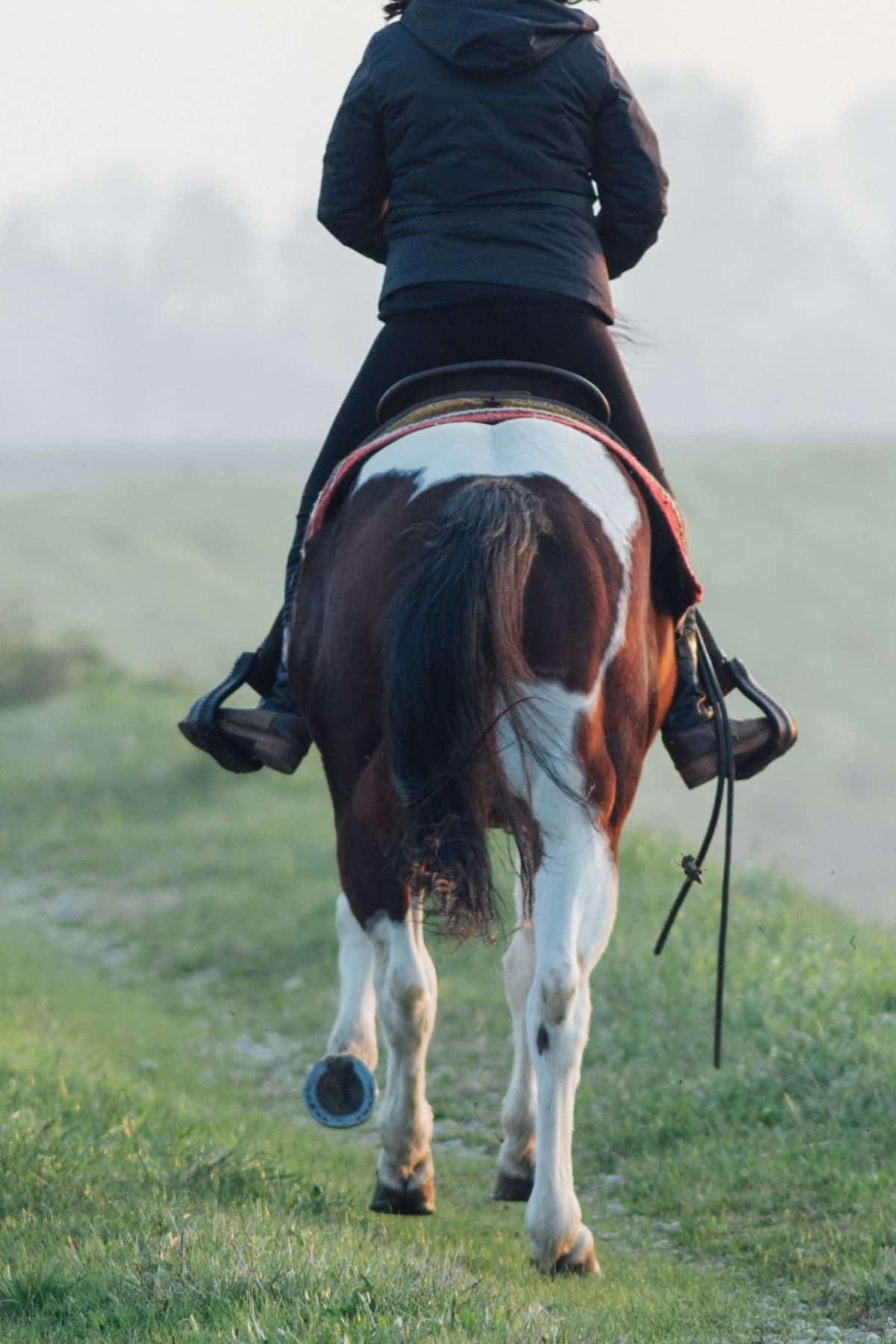

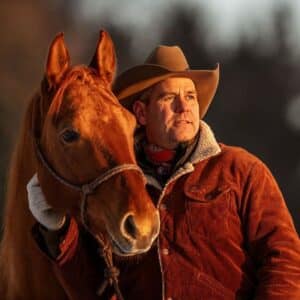
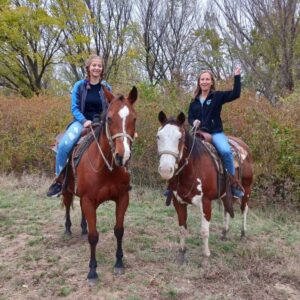
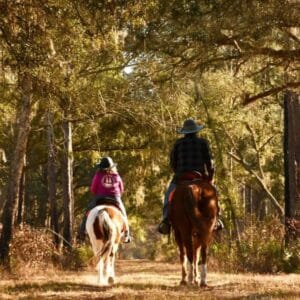
Leave a Reply